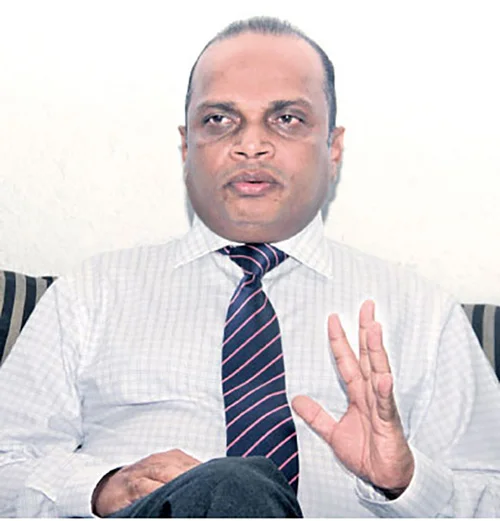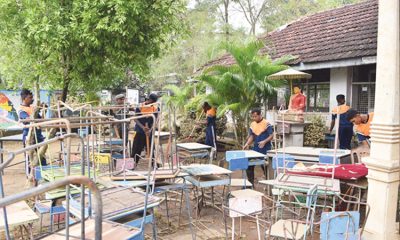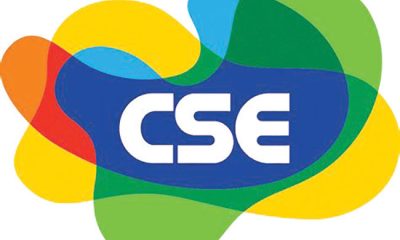Business
Rate reduction by Central Bank exerts rejuvenating impact on CSE

By Hiran H.Senewiratne
The stock market yesterday was extremely bullish on account of the Central Bank decision to reduce the Standing Deposit Facility Rate and the Standing Lending Facility Rate by 50 basis points. It was a major surprise for stock market investors.
Further, Central Bank Governor Dr Nandalal Weerasinghe’s positive comments on the national economy and its way forward lifted the spirits of local and foreign investors, market analysts said.
Amid those developments both indices moved upwards. The All Share Price Index went up by 100.7 points while S and P SL20 rose by 57.21 points. Turnover stood at Rs 2.4 billion with four crossings. Those crossings were reported in Sampath Bank, which crossed 5 million shares to the tune of Rs 390 million; its shares traded at Rs 78, LOLC 200,000 shares crossed for Rs 79.25 million; its shares traded at Rs 405, Hayleys 650,000 shares crossed for Rs 53.3 million; its shares traded at Rs 82 and Hayleys Fabrics 590,000 shares crossed for Rs 23.9 million and its shares sold at Rs 40.50.
In the retail market top seven companies that mainly contributed to the turnover were; Sampath Bank Rs 314 milllion (4 million shares traded), DFCC Bank Rs 280 million (3.9 million shares traded), HNB Rs 121 million (706,000 shares traded), Browns Investments Rs 69.1 million (12.7 million shares traded), LOLC Finance Rs 49.9 million (9 million shares traded), LOLC Holdings Rs 46.9 million (117,000 shares traded) and Ceylon Grain Elevators Rs 41.65 million (248,000 shares traded). During the day 80.7 million share volumes changed hands in 14200 transactions.
It is said that high net worth and institutional investor participation was noted in Sampath Bank, LOLC Group of companies and Hayelys. Mixed interest was observed in Sampath Bank and LOLC Holdings while retail interest was noted in Tess Agro, Industrial Asphalts and Browns Investments.
The Banking sector was the top contributor to the market turnover (due to Sanasa Development Bank and Nations Trust Bank) while the sector index gained 0.20%. The share price of Sanasa Development Bank decreased by 40 cents to descend to Rs. 30.60. The share price of Nations Trust Bank closed flat at Rs. 104.50.
The Capital Goods sector was the second highest contributor to the market turnover (due to Hayleys), whilst the sector index edged down. The share price of JKH recorded a gain of 50 cents to reach Rs. 190.50. The share price of ACL Cables appreciated by 50 cents to reach Rs. 83.90.
Yesterday, the rupee opened stronger at Rs 301.90/302.00 to the US dollar in the spot forex market, stronger from Rs 302.60/70 the previous day, dealers said.
Bond yields were down. A bond maturing on 15.12.2026 was quoted at 11.25/32 percent, down from 11.30/40 percent on Monday. A bond maturing on 15.12.2028 was quoted at 12.05/15 percent, down from 12.10/15 percent.
Business
Birthday gift turned lifeline: US-based young environmentalist steps up for Sri Lanka

For Daham Perera, a December birthday celebration this year became something far more meaningful than cake, candles or gatherings with friends. Instead, it turned into a deeply personal act of solidarity with a country he calls his motherland.
Perera, a young environmental enthusiast based in Los Angeles, says his bond with Sri Lanka remains unbroken despite living thousands of miles away. “Although I live in America, my parents and all my relatives live in beautiful Sri Lanka. That connection is something I carry with me every day, he said.
Having visited Sri Lanka in August, Perera spent weeks traveling across the island, reconnecting with relatives and visiting historical and environmentally significant sites. “I saw the true beauty of Sri Lanka – its people, its biodiversity, and its rich heritage. Those memories are among the most beautiful in my life, he recalled.
That joy, however, was short-lived. Soon after his return, the devastating Ditwah cyclone struck the island, leaving a trail of destruction. Homes were damaged, livelihoods disrupted and families displaced. “When I saw images of my friends losing their homes, books soaked in mud, clothes ruined by floodwaters, I felt a pain I cannot put into words, Perera said.
As an environmentalist, the damage to Sri Lanka’s fragile ecosystems troubled him deeply. “Sri Lanka’s biodiversity is priceless. When disasters like this strike, it is not just people who suffer, but forests, wildlife and entire ecosystems that take years to recover, he noted.
With his birthday falling on December 9, Perera made an unconventional decision. “Normally, my father and I celebrate our birthdays by going to the temple and spending time with friends. But this year, celebrating didn’t feel right when my people were suffering, he explained. “I kept asking myself—what can I do, even from afar?”
The answer was simple but powerful. Perera chose to donate all the money he had saved for his birthday celebrations, along with additional contributions from his family, towards relief efforts in Sri Lanka. “Economic support at times like this is critical. Even a small contribution can help a family rebuild, restart a livelihood, or regain dignity, he said.
The donation was formally handed over to Sri Lanka’s Consul General in Los Angeles, Charith Yattegoda, at the Consulate premises. For Perera, the gesture carried deep emotional significance. “If I can replace my personal happiness with smiles on the faces of people back home, that is the most beautiful birthday I could ever celebrate, he reflected.
He describes the letter of appreciation he received in return as his most treasured gift. “That thank-you letter is not just paper. It is a reminder that loving your country means standing by it in its darkest moments. It will always remain one of the most meaningful keepsakes of my life, Perera said.
Perera hopes his story will inspire other young Sri Lankans living overseas to stay connected and give back. “Distance should never weaken our responsibility. Supporting Sri Lanka—its people, its economy, and its environment—is something we can all do, no matter where we live, he added.
In turning a birthday into an act of compassion, Daham Perera has offered a quiet but powerful reminder: sometimes, the greatest gifts are the ones we give away.
By Ifham Nizam
Business
John Keells Foundation partners Sri Lanka Police in combatting violence against women and children

As part of its ongoing commitment to combat violence against women and children towards empowering a healthy and progressive nation, John Keells Foundation (JKF) continues to empower law enforcement agencies through Project WAVE (Working Against Violence through Education) – its flagship of over ten years – to combat gender-based violence and child abuse.
These activities include a strategic collaboration through which JKF supported the Sri Lanka Police to enhance their response to crimes involving women and children through the sponsorship of a global cutting-edge investigative software for use in the Cyber Investigation Unit (CIU) at the Bureau for the Prevention and Investigation of Abuse of Children and Women (BPIACW). The software enables officers to analyse and connect data efficiently, strengthening their ability to investigate and prevent online exploitation and related offences. BPIACW reported that the new platform had directly contributed to a significant and measurable improvement in their investigative capacity, recording the rescue of 22 children, the arrest of 21 suspects, and the filing of 111 cases in courts within the first year of its deployment.
Speaking on the partnership with JKF, Deputy Inspector General of Police – Ratnapura, and Former DIG – Children & Women Abuse Prevention 8 Investigation Range, Renuka Jayasundara said, “We extend our sincere gratitude to JKF for your steadfast partnership and for serving as a cornerstone of our efforts to strengthen child protection services through Project WAVE. Your contribution is making a tangible and quantifiable difference as evidenced by the growing numbers of successful investigations and legal referrals.”
Beyond technological support, JKF has also conducted a series of Train-the-Trainer (ToT) programmes, to improve the ability of officers to respond to GBV and CP in a sensitive and effective manner. The sixth such ToT was conducted from 24th to 26th of September 2025 for the benefit of nominated officers of the Homagama, Kaduwela and Maharagama police divisions. To date, 162 officers across 60 police stations have been impacted.
Business
SLANZBC appreciative of help from Australia and New Zealand

The Sri Lanka Australia–New Zealand Business Council (SLANZBC) has extended its profound gratitude to both the Australian and New Zealand governments for the generous and timely assistance provided to Sri Lanka during the recent flood devastation.
Chandana Amaradasa, SLANZBC president, noted that both governments donated one million dollars each, in their respective currencies, at a critical moment for Sri Lanka — support that will play a significant role in helping communities rebuild their livelihoods.
The government of New Zealand has pledged NZ$1 million to support humanitarian relief efforts in Sri Lanka following Cyclone Ditwah.
This assistance will be channeled through an international
humanitarian partner to strengthen ongoing rescue and relief operations.
Similarly, the Australian government announced on November 30, 2025 that it will provide AUD 1 million in humanitarian aid to bolster Sri Lanka’s response to Cyclone Ditwah.
These compassionate and timely gestures, Amaradasa said, once again demonstrate the unwavering commitment of both countries to stand beside the Sri Lankan people in times of crisis. He also recalled that
Australia and New Zealand have consistently supported Sri Lanka, stepping forward during previous national emergencies as well.
Today’s humanitarian assistance further reaffirms the depth of these longstanding relationships and the true spirit of friendship that binds the nations — a bond built on mutual respect, shared values and enduring goodwill.
“Our association deeply appreciates this kind and meaningful support and remains committed to fostering even closer ties between the people of Sri Lanka, New Zealand, and Australia, he added.
By Hiran H Senewiratne
-

 Features6 days ago
Features6 days agoFinally, Mahinda Yapa sets the record straight
-

 Features6 days ago
Features6 days agoHandunnetti and Colonial Shackles of English in Sri Lanka
-

 Business5 days ago
Business5 days agoCabinet approves establishment of two 50 MW wind power stations in Mullikulum, Mannar region
-

 News5 days ago
News5 days agoGota ordered to give court evidence of life threats
-

 Features5 days ago
Features5 days agoCliff and Hank recreate golden era of ‘The Young Ones’
-

 Opinion6 days ago
Opinion6 days agoA national post-cyclone reflection period?
-

 Features5 days ago
Features5 days agoSri Lanka and Global Climate Emergency: Lessons of Cyclone Ditwah
-

 Latest News6 days ago
Latest News6 days agoSri Lanka squad named for ACC Men’s U19 Asia Cup























